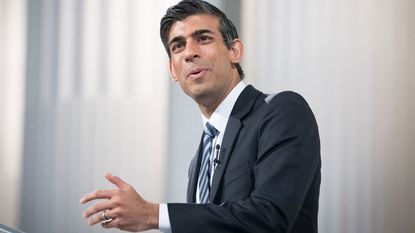State pensioners probably aren’t going to get an 8% pay rise next year
The “triple-lock” could in theory mean an 8% rise in state pensions this year. But that’s not going to happen. Saloni Sardana explains what the triple lock is, and why the chancellor wants to scrap it.


Governments globally have spent a great deal of money to contain the worst economic fallout from Covid-19. Now they’re wondering how to keep the public finances under control.
The last thing the UK government needs right now is a massive increase in one of its biggest bills – the state pension.
So it’s little wonder that there’s a lot of talk this week of chancellor Rishi Sunak putting a halt to the “triple-lock” on the state pension – even if it means breaking a manifesto pledge.
Subscribe to MoneyWeek
Subscribe to MoneyWeek today and get your first six magazine issues absolutely FREE

Sign up to Money Morning
Don't miss the latest investment and personal finances news, market analysis, plus money-saving tips with our free twice-daily newsletter
Don't miss the latest investment and personal finances news, market analysis, plus money-saving tips with our free twice-daily newsletter
So what is the “triple lock” and will it be scrapped for 2022?
What is the triple lock and why was it introduced?
The triple lock pension is the formula by which state pensions are set each year. Currently, state pensions rise in line with either the cost of living (as measured by the annual change in the consumer prices index – CPI); the change in average earnings; or 2.5% – whichever is highest.
These three factors are known as the triple lock. It was introduced by the Conservative/Liberal Democrat coalition in 2010 and was intended to act as a guarantee that pensioners’ purchasing power never gets eroded by higher living costs.
Given the relatively low levels of inflation since then, pensioners have enjoyed significant “real” terms increases in their pensions – which is one factor that has helped to drastically reduce the number of pensioner households living beneath the poverty line.
How has Covid-19 made the triple lock controversial?
Maintaining the triple lock until at least 2024 has long been a key Conservative manifesto promise. But while the Conservatives have wanted to honour that pledge, statistical oddities related to the Covid-19 shutdown and recovery make that rather difficult.
Covid-19 resulted in millions of workers being put on furlough – reducing their wages while being able to keep their jobs. Then, when the economy started to reopen, many of those who were furloughed returned to their old jobs or sought new ones.
One result of this is that the rise in wages for this year has been artificially inflated.
The most recent reading for average earnings growth from the Office for National Statistics (ONS) found that headline wages were growing by more than 8% a year. However, in most cases, earnings haven’t increased by anything like that much – the number is simply being inflated by people coming back to work. The ONS reckons that actual wage growth is more in the range of 3.5% to 4.9%.
How likely is it for the triple lock to change?
If it is up to Sunak then there is a high chance the triple lock may be lifted, as the chancellor has clearly signalled he is willing to break the manifesto promise, due to numbers being grossly inflated because of the pandemic.
There is certainly nothing to stop him. Politically, it could prove unpopular – although at the same time, given the unusual circumstances and the fact that we’ve racked up a lot of debt during the pandemic, it shouldn’t be difficult to explain why boosting the state pension by 8% based on faulty statistics is probably not the best use of public money.
As Julian Jessop, economic adviser to the Institute of Economic Affairs think tank, points out, each percentage point increase will mark a £900m rise in annual spending on state pensions.
Forecasts by the Office for Budget Responsibility indicate that upholding the triple lock promise for next year would increase state pension spending in 2024-2025 by £6bn more than if it rose at the pace of inflation.
What’s next?
It looks as though the government will announce its decision later this week, alongside its ideas on paying for social care – we’ll cover both topics when the news is confirmed, but it looks as though the state pension is most likely to rise by inflation or 2.5%, rather than the artificially inflated earnings figure.
Saloni is a web writer for MoneyWeek focusing on personal finance and global financial markets. Her work has appeared in FTAdviser (part of the Financial Times), Business Insider and City A.M, among other publications. She holds a masters in international journalism from City, University of London.
Follow her on Twitter at @sardana_saloni
-
-
 Investment trust discounts hit 2008 levels. Here’s how to profit
Investment trust discounts hit 2008 levels. Here’s how to profitInvestment trust discounts have risen to levels not seen since 2008, here are three trusts looking to buy to profit.
By Rupert Hargreaves Published
-
 A luxury stock to buy at a high street price
A luxury stock to buy at a high street priceInvestors wrongly consider Watches of Switzerland a high-street outlet.
By Dr Matthew Partridge Published
-
 August NS&I Premium Bond winners unveiled - have you scooped £1m?
August NS&I Premium Bond winners unveiled - have you scooped £1m?Two lucky NS&I Premium Bond winners are now millionaires in the August draw. Find out here if you are one of them
By Tom Higgins Published
-
 Savings rates more than double in a year as challenger banks top the best buy tables
Savings rates more than double in a year as challenger banks top the best buy tablesThe best savings rates have doubled - and in some cases tripled - in a year, with challenger banks offering the highest rates. While they are still no match for inflation, we look at what you could be earning.
By Ruth Emery Published
-
 Midlife MOT: what is it and who can get one?
Midlife MOT: what is it and who can get one?The government has launched an online midlife MOT to help older workers with financial planning, health guidance and career skills. But how does it work, who can get one and would you pass it?
By Ruth Emery Published
-
 Coventry Building Society launches new best easy access savings account
Coventry Building Society launches new best easy access savings accountCoventry Building Society's deal tops our easy access savings account list, but could your cash be put to better use?
By Tom Higgins Published
-
 NS&I boosts fixed-term savings rates
NS&I boosts fixed-term savings ratesThe NS&I, the government-backed savings institution has mirrored recent rate rises seen elsewhere in the market.
By Tom Higgins Published
-
 Should you let AI give you financial advice?
Should you let AI give you financial advice?Can AI fill the financial advice gap? Kalpana Fitzpatrick looks at the pros and cons of using AI to guide your finances.
By Kalpana Fitzpatrick Published
-
 Small pension pots to be consolidated, says DWP
Small pension pots to be consolidated, says DWPWorkplace pension schemes worth less than £1,000 that become “deferred” when a saver changes jobs will be consolidated under a new system
By Ruth Emery Published
-
 Watchdog summons banks to explain paltry savings rates
Watchdog summons banks to explain paltry savings ratesSavings rates trail mortgage rates - and the financial watchdog has summoned banks to a meeting amid concerns of profiteering.
By Katie Binns Last updated









